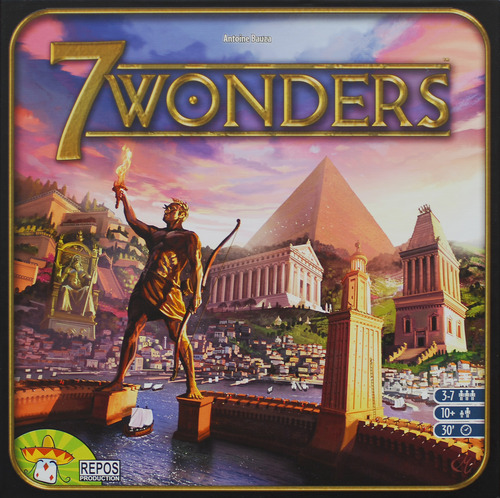 There are not many board games that can scale from 2 players to 7 players without lost in quality or a drastic increase in play time. 7 Wonders is one of those rare exceptions. It combines unique game play mechanics with easy to learn rules and a quick play time. You can play a full game of 7 Wonders with 7 people in under 45 minutes, which can sometimes be a rarity in board gaming. The game’s easy to learn rules also make it accessible to gamers and non-gamers alike. More than once I’ve played 7 Wonders with family or friends who aren’t big into gaming. So what is it about 7 Wonders that makes it worth your time at the gaming table? Read on to find out!
There are not many board games that can scale from 2 players to 7 players without lost in quality or a drastic increase in play time. 7 Wonders is one of those rare exceptions. It combines unique game play mechanics with easy to learn rules and a quick play time. You can play a full game of 7 Wonders with 7 people in under 45 minutes, which can sometimes be a rarity in board gaming. The game’s easy to learn rules also make it accessible to gamers and non-gamers alike. More than once I’ve played 7 Wonders with family or friends who aren’t big into gaming. So what is it about 7 Wonders that makes it worth your time at the gaming table? Read on to find out!
7 Wonders is a card game for 2-7 players that plays in about 45 minutes. 7 Wonders will play great with any amount of the 3-7 player range.
Game Overview:
7 Wonders is a card game which you are tasked with building up your civilization through a series of 3 ages (rounds). Your civilization is built by playing cards every round to your play area. The cards range from production buildings (allowing you to have the supplies to play later cards) to Victory Point buildings to special action buildings.
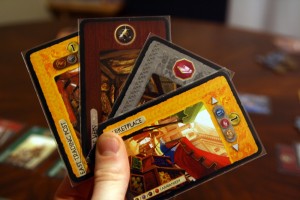
What makes 7 Wonders unique is how the hand management works. Every round, each player plays one card simultaneously and then they pass the rest of their hand to the player on their right or left (depending on the age). That’s right, you have to pick one available card in your hand to use and then pass the rest along. So in a 7 player game, you may only ever get to choose 1 card from a particular hand. It’s a really neat mechanic that forces you to balance what card you want to play with what cards you don’t want to give your opponent access to. As the rounds progress, players will work to acquire victory points, the ultimate goal of the game. At the end of the 3rd age, the player with the most victory points is the winner.
Components:
As with most card games, there is not a lot to the components. The main thing in the 7 Wonders box are the piles of well illustrated cards. Each has a name, cost, picture and effect symbol. The cards are both functional and well designed.
Also included with the game is a number of cardboard tokens, as well as double sided player boards each representing a different wonder. The wonders are all different and will require you to slightly tailor your strategy to them. Some provide free cards while others might be more focused on science buildings. If you go random draw to select your wonder, be prepared to be flexible with your strategy.
How to Play:
Every player in 7 Wonders will get a different ancient civilization to control. As mentioned before, each one is unique, you will be advised to tailor your play strategy to that specific civilization. While it is optional, most players will be constructing their wonder during the game as they provide both victory points and a tangible benefit. The wonder boards also start with one resource the player will have access to during the game. Players then collect 3 coins and their opening hand of 7 cards.
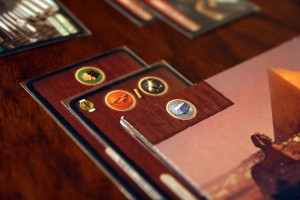
Once play begins, each player selects a card they want to play from their hand and simultaneously reveals it, putting it in their play area. Some cards have a cost which are paid for by having access to the appropriate resources in your play area. You don’t actually have to spend the resource, just produce it. So if a card costs 1 ore, you just need access to a card in your play area that produces ore.
One of the areas where player interaction happens is when you buy resources from your neighbors (the players sitting directly adjacent to you on either side). Resources cost 2 coins per resource and a player can’t decline the sale. Buying a resource doesn’t stop the owning player from using it that turn, it just gives you access to it.
Once each player has played and paid for their chosen card, all hands are passed either clockwise or counterclockwise (depending on the age). You then pick up your new hand of cards and choose another to play. This repeats until each player has only 2 cards left in their hand. At this point each player chooses one of the last 2 to play, discards the other, and the age is over.
As you get into the 2nd and 3rd ages, cards will not only get more powerful, but require more resources. One way to get around the high costs is by the use of chaining. Certain earlier cards can build later cards for free. Each card lists both what it can build for free and also how it can be built for free. It’s a great mechanic that helps you to plan for later rounds. Finally, if a player can’t (or doesn’t want to) play a card, they can sell (discard) a card for 3 coins.
In between ages, players check for military score and hand out victory point chips appropriately. Military is based on how many military structures you’ve built compared to your immediate neighbors. The loser of the comparison gains a -1 VP chip while the winner gains positive VPs, either 1, 3 or 5 depending on the current age. After that is settled, players deal out a new hand of cards for the next age. Once age 3 is completed, the game is over and the final scores are tallied up. The player with the most victory points is the winner.
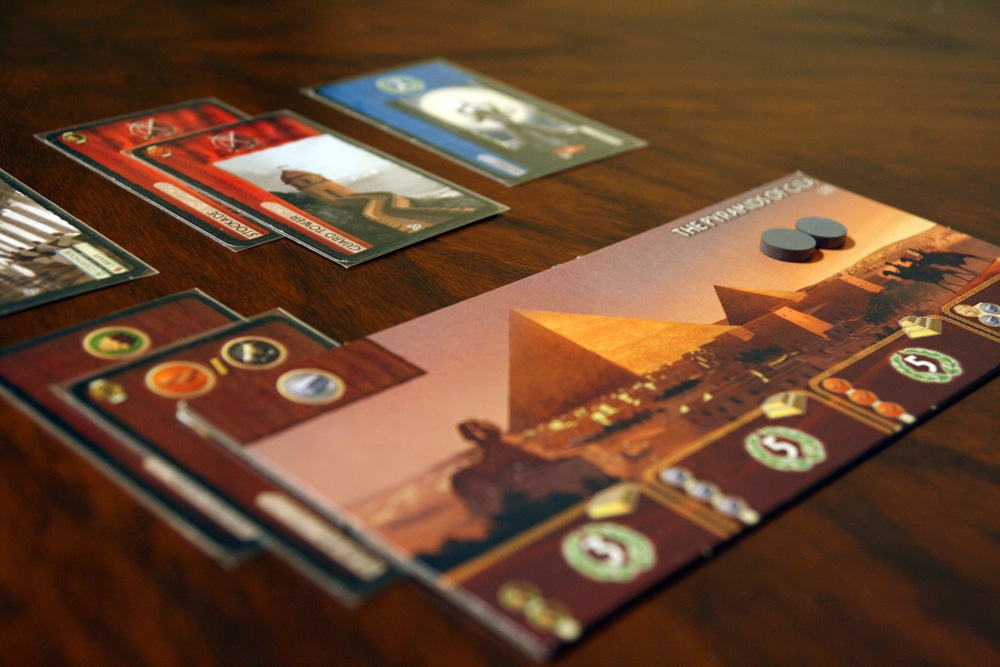
Game Experience:
The game play in 7 Wonders is delightfully simple, yet the variety of cards make the strategy level run deep. I love all the different cards that will come across your hand during the game. There are different types of resource production buildings, victory point buildings, cards that impact your neighbors, and the high scoring science buildings. With a limited amount of cards you can play during the game, 7 wonders demands that you have a strategy that is both flexible and conscious of what your neighbors are doing.
And that’s the key with 7 wonders, to be adaptive in your strategy. A quick way to ensure you lose is to copy what your fellow players are doing. Since cards are being passed around, you can bet your neighbors will try and deny you any cards that you obviously need. That’s why a player has to be flexible. You may really want to go military, but if the player 2 spots down is going heavy military, you might never see a good card for it. Or if a you are going heavy science, you can bet that the person next to you will be choosing science cards when deciding which card to bury under their wonder.

One of the things that keeps me coming back to 7 wonders is the variety. I have dubbed 7 Wonders my favorite game that I almost never win. I don’t know what it is about the game, but I’m constantly an “also ran.” Even though I lose a good amount of the time, I enjoy the hell out of every game I play. I think that actually says a lot about the game. If you can get a player coming back to play more and more who never wins, you know you have a fun game on your hands.
In addition to requiring the players to be flexible, 7 Wonders also helps to keep things interesting by its card interaction. I love how some early buildings can build later buildings for free. The chains aren’t always completely obvious either, sometimes a science building will lead to a military building later in the game. These free buildings can be a god send late in the game when resourceful costs are high to construct most every building.
Another thing 7 Wonders has going for it is that the game only takes about 45 minutes (or less) to play. Most of the time when we play, we will get in at least 2 games in a row. The setup is fairly quick and once all players have a feel for the rules, so do the turns. Between games players can also switch out their wonders to help keep the new game fresh and different. If you’ve bought the wonder pack expansion, you will have a lot of player choices each game. This helps add to the replay value.
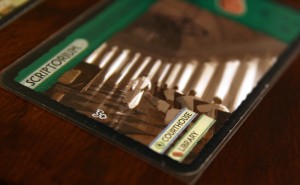
If I had a complaint with 7 Wonders, it would be its heavy reliance on symbols. Every card has a symbol on it and sometimes they are not the most intuitive. I think it adds a bit to the learning curve to decipher them all, especially if you don’t play often. We have even made a player aid for our players to aid in this process. It’s not a huge issue, but it will make first time players struggle a bit more.
But honestly, that’s my only real complaint about the game. 7 Wonders is a game I’m always willing to bring to the table and that I’ll play over and over. My copy of the game is definitely…well loved. 7 Wonders runs deep on strategy without overly complex rules. One of my favorite parts of the game though is that it scales seamlessly from 2-7 players. While 2 is less then ideal (you need a dummy city), 3+ is the ideal range. Most games will add to the play time when you add in more players. Since all the turns happen simultaneously in 7 Wonders, that’s not really an issue. The game takes about 30-45 minutes whether you have 4 players or 7. The game stays balanced based on the number of players as well. There are not a lot of games that can boast these accolades.
Final Thoughts:
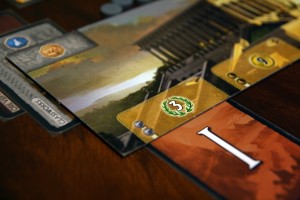
In case you can’t tell, I love 7 Wonders. It’s easily one of my top 5 favorite games. Its rare that I can find a game that will accommodate 7 players without it taking 4 hours to play. The unique game mechanics in 7 Wonders also consistently have me coming back for more as well. I love the concept of passing your hand after each play (card drafting) as it forces players to keep on their toes and adds in a bit of excitement of something new each round. Add that to the fact that the rules are easy to learn makes it an easy choice to get to the gaming table.
So far, there have also been 2 expansions for the game. The first was 7 Wonders: Leaders. This expansion added a leader card to each civilization. This probably isn’t my favorite expansion for the game as I doesn’t seem to flow with the game as well as it could have. Most of the time we usually play without it.
The second and recently released expansion is 7 Wonders: Cities. This expansion was an immediate hit in my book. It added a new group of cards that flows in seamlessly with the base game. They new cards only require minor explanation to understand and introduce a couple of new (yet easy to understand) game mechanics.
If you are looking for a light euro game to try out, I’d highly recommend 7 Wonders. The strategy, play time, and unique mechanics make it a perfect fit for any game night. It is also non-gamer friendly so it makes a fantastic gateway game.
If you are interested in getting a copy for yourself, it’s about $30.
Final Score: 5 Stars – A unique and fun game that is different every time you play. A must own!
 Hits
Hits
• Quick play time
• Unique game play
• Scales perfectly from 2 to 7 players
• Very high replay value
Misses
• Slight learning curve for new players due to the symbols






















I’ve played a lot of 2p 7 Wonders and it’s still fantastic, the dummy civilization can be played in an interesting way to try and screw with your opponent or advantage you (using cards they need, buying resources from you, things like that). 🙂
That’s good to know James. I might have to get the 2 player version a try.
Have owned this game for a couple years and never played. It is rather complicated for non gamers. Each time we go to the instructions, interest is lost long before we ever understand what to do.
If you are looking for a good gateway game for card drafting, check out Sushi Go!. It will teach you some basic mechanics pretty easily, and from there, it’s a lot easier to get into 7 Wonders.
I lost my 7 boards, are they available anywhere online
This game is one of the best, if not THE best for higher player counts, as in more than 5 players. With that said, it’s great for 3-5 as well 🙂
Nice review!